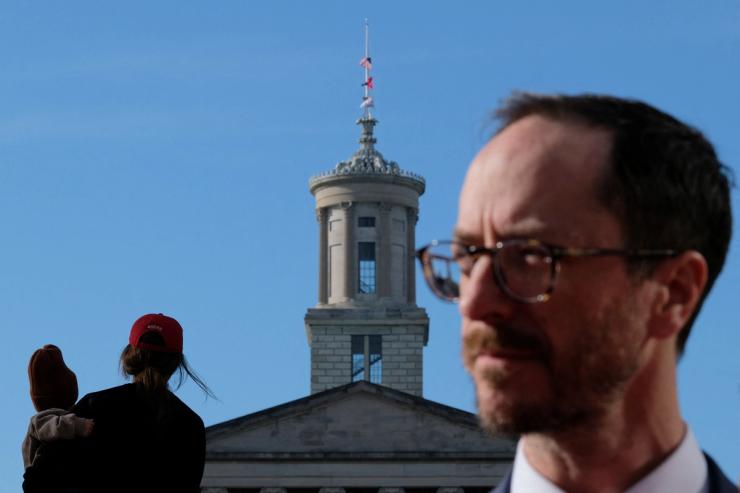David’s view
For the whole of Freddie O’Connell’s life, Nashville had a Democratic mayor and a Democratic member of Congress. That ended two-and-a-half years ago, a few months before O’Connell moved into City Hall.
Republicans, who controlled the 2021 redistricting process, cracked the city into three Republican districts. Democratic Rep. Jim Cooper retired, mournful that he couldn’t “keep our city whole.” Instead of a Nashville booster who shared the city’s liberal politics, Davidson County got three Republicans who assuredly did not. They did not even live there.
That fueled tensions between the city and the congressional delegation, beginning when ICE worked with local highway patrolmen to detain suspected undocumented immigrants in South Nashville. O’Connell updated a city ordinance that required immigration enforcement to be reported to his office, and endorsed The Belonging Fund, which provided aid to families affected by the raids.
Rep. Andy Ogles, R-Tenn., the Republican who’d won the re-formulated, redder, Nashville seat, launched two House investigations of the mayor, accusing him of defending “criminals over Nashvillians” — especially after the city published (then removed) some ICE agents’ names. This week, Ogles urged the president to deploy the National Guard in Nashville and Memphis.
“Comrade O’Connell is using the city as an outpost for international gangs to set up shop in our neighborhoods,” Ogles said in a statement.
“Perhaps he’d like to invite the National Guard into his actual community,” O’Connell said in his response, calling Ogles “disrespectful to our hardworking police.” Crime was down; Ogles was acting like it wasn’t.
Tennessee’s Republicans, who hold stable supermajorities in state government, were always going to clash with the mayor. They’d clashed with his predecessors. But they’d been ahead of the year’s major electoral trend: The elimination of House seats drawn around Democratic cities. More cities may join the archipelago of blue dots with no real power in Congress.
In Missouri, Republicans returned to work this week intending to pass a new map that would split Kansas City, putting pieces of it in three safe red districts. Indiana Republicans have moved more slowly, but their party has circulated a map (drawn by an online conservative) that would break up the 7th District, a rectangle covering Indianapolis and its close Marion County suburbs; the county would be drawn into three seats that stretch into small towns and rural areas that backed Trump in 2024.
This newsletter has written all year about the confident MAGA move against cities. Democrats assume that they can’t win the re-drawn districts, because the politics that win in urban areas are toxic outside of them; the old party brand that could compete in small town Indiana or middle Tennessee is deader than Pan Am.
None of these cities will be as powerless as DC, constitutionally barred from a vote in the House or Senate. But the number of liberal urbanites who won’t be able to elect like-minded members of Congress is growing. It’ll grow again if the Supreme Court weakens the Voting Rights Act next year, and states no longer need to draw minority-majority districts.
You can see the outline of a party system where Democrats simply can’t win the House without finding a way to appeal to exurban and rural voters with very different values than their core base of city-dwellers. They don’t even know if that’s possible. In the meantime, they have Nashville. Sort of.
“The harder part is not having a congressional office in the city to refer people to and having to think in terms of three different geographies when trying to keep people connected to Congress from Nashville,” O’Connell told Semafor. “And, of course, it’s especially difficult when one of your 3-member delegation is openly antagonistic to the city.”
In this article:
Room for Disagreement
Northwest Iowa state Rep. J.D. Scholten, who helped organize his party’s victory in a GOP-held seat last month, said that Democrats could seize opportunities if they competed in rural areas.
“It was the first time there was investment in Sioux City probably since my 2018 campaign. Sioux City is a city of 85,000 people and there’s less than 28,000 registered voters. We rely too much on county parties and activists who are volunteers,” Scholten said. “So if Republicans want to try to gerrymander their way into keeping power, Democrats should be broadening their targets and they’ll get some much needed surprise wins.”
Notable
- For KCUR in Kansas City, Emily Younker looks at the different communities that a new Missouri map would mash together. “Those in the city and those of us who live in rural Missouri, it’s just very different.”
- In the Indiana Capital Chronicle, Whitney Downard talks to “voting rights advocates” who worry about the implicated of rushed maps.


